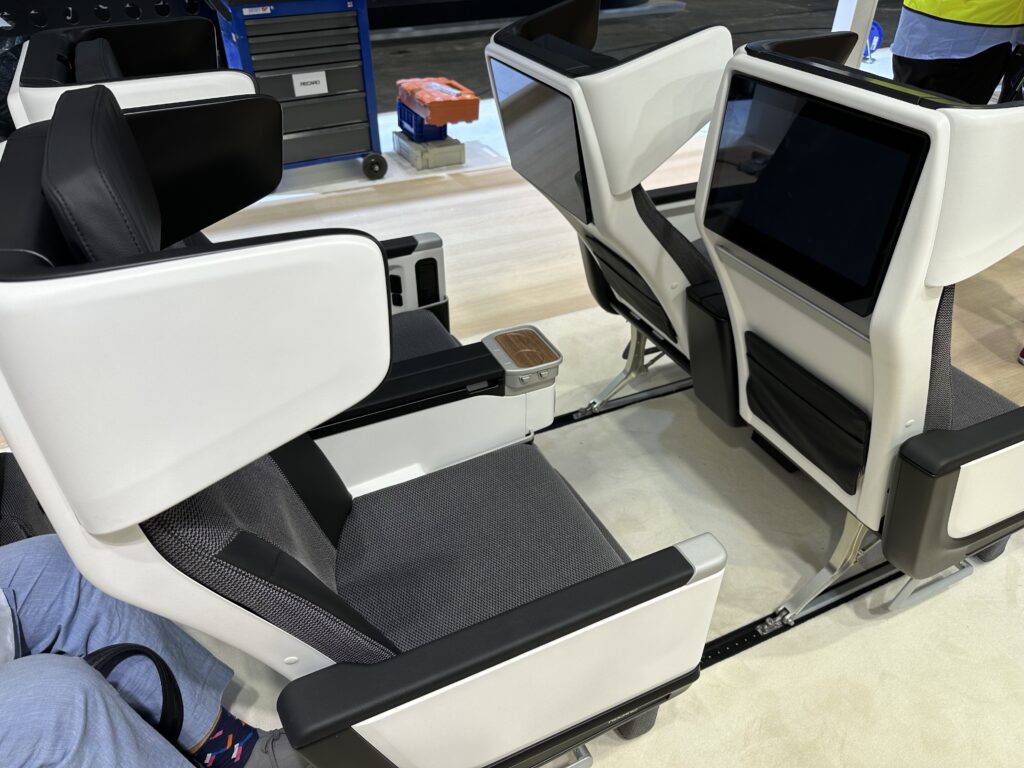HAMBURG — If you, as an airline or a passenger, loved Recaro’s snappily monickered PL3530 longhaul premium economy recliner, you’ll love its successor, the equally catchily named PL3810, which is some ten per cent lighter and just as comfortable, if not more so.
Runway Girl Network tested out the seat at a special preview on Recaro’s Aircraft Interiors Expo stand, and the comfort level — at least on the non-production prototype — was at least equal to the PL3530, and in some ways superior.
The thematic driver behind the seat’s development, chief executive officer Mark Hiller tells Runway Girl Network, is “embracing premium space”, and the seat certainly accomplishes that.
Recaro says the ten percent weight reduction compared with the previous generation of seats is generated by the use of composite materials — Recaro has had an internal centre of composited production at its AAT Composites production site near Cape Town in South Africa — and an optimised design.
Selling points for the seat, Hiller suggests, will include “lightweight design with lower seat weight, improved privacy features and living space, additional stowages, ease of customisation, [and a] large single plate table.”
That customisation, he notes, can include “use of application decor foils on multiple surfaces, customised colours for foils and metallic parts, customised stowages, and customised design for privacy wings.”
PL3810’s kinematics use manual seat actuation as opposed to automatic, and Recaro is aiming them for widebody use: the Boeing 787 and 777, plus the Airbus A330, A350 and, notably enough on the seatmaker’s list, the A380.
The PL3810 succeeds the previous generation’s PL3530, operated by a wide variety of airlines in a number of forms: the older seat is used by airlines including Emirates, Air China and Vistara, while Recaro says it has three customers for PL3810.
The evolution from PL3530 to PL3810, Hiller says, is driven by “high growth potential and increasing interest in customisation in premium class seating products.”
Indeed, Emirates’ substantial customisation of the previous generation PL3530 suggests that there are airlines out there that want to explore the full range of the passenger experience that the recliner form can offer.
 In its standard form, PL3810 can be pitched starting at 37”, with the upper end of its usual limit at 40”, although there is no theoretical pitch limit — presumably, once the test dummy passenger’s head has cleared the seat in front, there’s no certification limit on the upper end. The seat features a 15.6” inflight entertainment screen.
In its standard form, PL3810 can be pitched starting at 37”, with the upper end of its usual limit at 40”, although there is no theoretical pitch limit — presumably, once the test dummy passenger’s head has cleared the seat in front, there’s no certification limit on the upper end. The seat features a 15.6” inflight entertainment screen.
Privacy “wings” are installed at the head area, and this has been a matter of some discussion, both by airlines — some of which have selected smaller wings on the sides of the seat immediately adjacent to the aisle and window, and larger wings on the sides of the seat immediately adjacent to a neighbour — and by wheelchair users.
These wings, when present adjacent to the aisle, cause issues for level transfers of passengers from aisle wheelchairs to the aisle seats, even when the side armrest panel is swung upwards to mean that level transfer would otherwise be possible. At present, the wings cannot be removed.
Overall, this is a smart product evolution for Recaro: PL3530 was a useful element in Recaro’s full-aircraft, three-cabin strategy, and a lighter-weight recliner at the same or better comfort levels will certainly be welcome. It is interesting, though, to hear Recaro talking about this as “premium class” rather than “premium economy”, with an updated look and feel to match. Airlines are increasingly using opaque marketing to market this middle cabin at a level higher than premium economy, and seatmakers are taking notice.

PL3810 matches the naming custom of Recaros current fully-featured economy seat CL3810. Image: Recaro
Featured image credited to John Walton














